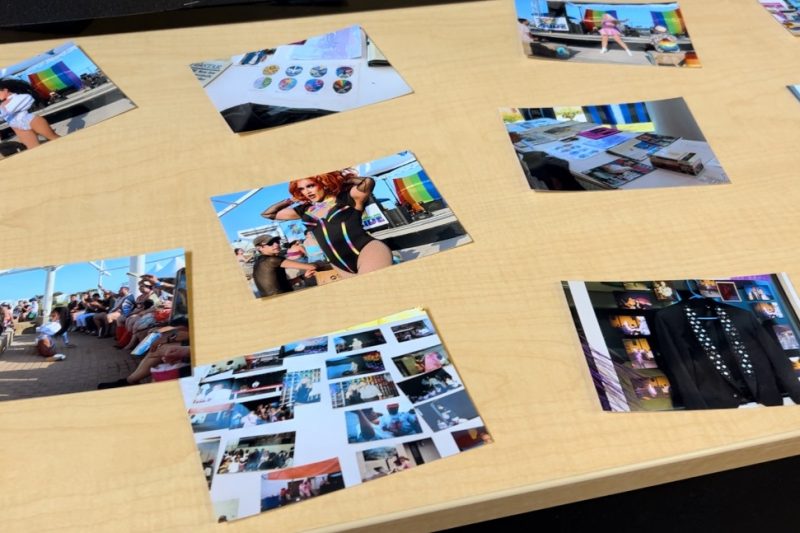UT Multi-Day Exhibition Highlighted Drag Performance in South Texas
By Evelyn Martinez
Reporting Texas TV
AUSTIN, Texas – Spanish pop and rhinestone gowns welcomed visitors to University of Texas Ph.D. graduate Sergio Barrera’s exhibit centered around queer artistry in South Texas. It debuted on campus at the Gordon White Building on Feb. 27. The eight-month long research project on drag culture in the Rio Grande Valley (RGV) region featured a collection of photographs, interviews and costumes of queens from McAllen to Brownsville. The preservation of this history in a larger city played an important role for Barrera.

Photos of drag performers laid out for guests to look through, displayed in UT’s Gordon White Building on Tuesday, Feb. 27, 2024 (Evelyn Martinez, Reporting Texas TV).
“Being in a place like Austin, you can say ‘Keep Austin Weird,’ but how do we keep Austin diverse,” he said. “Not only diverse in the sense of people from all over the world, but the narratives, the histories, the humanities. I think I had the perfect project and opportunity to do that.”
Barrera celebrated the artists by inviting two RGV queens to a live Q&A panel and a showcase of their talents at the exhibit’s grand opening. Queen Brooklin Mars, known as Eric Reyna outside of drag, jumped at the chance to talk to university students. Mars talked about her life as a queer person and what makes drag from the Valley so special.
“As someone who hails from the Valley, I’ve always felt the tiniest bit invisible,” Mars said. “It’s a good feeling to know that someone in a place like this, who has accomplished things like Sergio has, is paying attention to the people down there.”
Growing up as a queer Chicano in the area, Barrera said he felt a personal connection to the drag scene along the border. When drag bans swept the country following Tennessee’s Adult Entertainment Act, the first state that passed an anti-drag bill in the United States, Barrera documented the aftermath. He photographed and interviewed performers during the June RGV Pride celebration in South Padre Island, only weeks after the passing of Texas’ SB-12 restricted public drag performances. Despite the conservative narratives around queer people in Texas, seeing parents and their children taking part in the festivities encouraged Barrera to continue his project.
“The fact that I was able to see families building up families and being supportive of queer people, it was so beautiful to me,” Barrera said.
Beyond his showcase, Barrera is working towards publishing his research as his second scholarly book. With SB-12 declared unconstitutional, he hopes people will start listening and learning from their drag performers.
“When you pause and listen, and ask respectful questions, your mind will be blown,” he said. “If we all see ourselves as extended bridges between communities, identities and people, I think we’re more likely to find how all our lives intersect.”